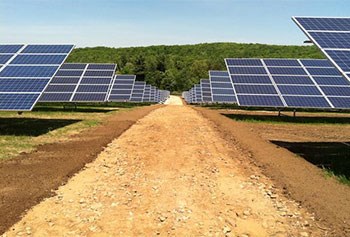
06/19/2014
Boston Business Journal
By Jon Chesto
Boston wind farm developer First Wind has apparently made a smooth transition into the solar business during the past year.
The developer has just signed its biggest solar agreement to date for a development in Utah, one whose power capacity would equal more than half of all of the solar panels that have been built so far in Massachusetts. This thing, when it’s done, will be one of the biggest solar power plants in the country.
First Wind just finalized four, 20-year power purchase agreements with Rocky Mountain Power. Those agreements would enable First Wind to finance and build a 320-megawatt solar project in Utah known as the “Four Brothers” project, which consists of four separate 80-megawatt facilities. The news follows a recent announcement that Rocky Mountain Power would buy 20 megawatts from First Wind’s smaller “Seven Sisters” projects in Utah. All of these Utah projects would be done by sometime in 2016.
First Wind has also been busy in its home state of Massachusetts, completing a 14-megawatt project in Warren this month and a 3-megawatt project in Millbury last month. UMass Lowell has contracts for power from both sites, and UMass Memorial and the town of Orange have contracts for the Warren project. (The Warren project, a First Wind spokesman says, is the second-biggest solar project in Massachusetts.) First Wind has also embarked on a solar project in Hawaii that, when completed, would have the capacity for 20 megawatts of power.
First Wind first entered the solar business in early 2013 by buying the development rights from Victus Solar to solar projects in three towns: the projects in Millbury and Warren, and one in Freetown.
First Wind, of course, is still moving ahead with wind farms. But this foray into solar, via its First Wind Solar Group, represents an attempt to broaden First Wind’s business. This is particularly important when it comes to renewable energy because each energy source can have different financial incentives that can ebb and flow based on the political tides. First Wind has also run into difficulties with locating some of its wind farms, and it still hasn’t found a place that would work to set up wind turbines in Massachusetts yet.
When it comes to solar, the incentives are all over the map, depending on the state. Here in Massachusetts, solar developers are rewarded with special certificates that can be sold to utilities so they can reach their renewable energy mandates. But the Legislature is currently looking at replacing that system with a different way of subsidizing solar energy. The generosity in this state toward solar energy has helped put Massachusetts in fifth place in the country based on installed capacity. That’s not bad for a state not known for its sunny weather.
